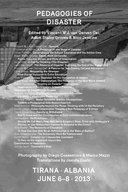Explore

Pedagogies of Disaster
Vincent W.J. van Gerven Oei (ed., author), Adam Staley Groves (ed., Nico Jenkins (ed., Christopher Fynsk, Oliver Feltham, Julia Hölzl, John van Houdt, Edith Doron, Urok Shirhan, Jonas Staal, Katharina Stadler, Andreas Vrahimis, Matthew Charles, Justin Joque, Tijana Stevanović, Denisa Kera, Sina Badiei, Nick Skiadopoulos, Judith Balso, Jonida Gashi
2013
0 Ungluers have
Faved this Work
Login to Fave
We live in an era where the university system is undergoing great changes owing to developments in financing policies and research priorities, as well as changes in the society in which this system is embedded. This change toward a more market-oriented university, which also has immediate effects in academic peripheries such as the Balkans, the Middle East, or South-East Asia, is of great influence for the pedagogical practice of “less profitable” academic areas such as the Humanities: philosophy, languages, sociology, anthropology, history.Because of the absence of a historically grounded establishment of the Humanities, academic peripheries, usually accompanied by a weak civil society infrastructure, seem to offer the most fertile ground for rethinking the Humanities, their pedagogical practice, and their politics, as well as the greatest threats, such as the ongoing capitalization of research, and profitability as the norm of educational achievement. The sprawling presence of for-profit universities and in academic peripheries such as Albania and Kosovo is indicative of this problematic, as are consistent underfunding of universities and the relentless budget cuts in American and English, and to a lesser extent European, universities. Motivations for this ongoing attack on the university are often driven by a political system or a politics with an aggressive stance to critical thought.At the same time, such an absence of historical grounding may inspire a rejuvenation and reinvigoration of research in the Humanities, such as may be seen in academic centers around Asia, as many young scholars are attracted to an educational environment which is not yet completely petrified in bureaucratic procedures. In this case, a different set of questions appear concerning the place of the scholar in societies with semi-democratic or even authoritarian rule. For civil society to flourish, an educational system that reflects and interrogates the values and concepts that underlie a healthy social fabric are of crucial importance.This volume comprises papers culled from continent. journal’s Pedagogies of Disaster conference held in Tirana, Albania, hosted by The Department of Eagles (Departamenti i Shqiponjave) in June 2013, and organized to address the fate of relation and the future of pedagogical practice in the University, and especially as it concerns the humanities. The papers gathered here seek to address the infrastructural or interpersonal changes in the modes of production as it relates to current academia, examining the elements and spaces of the rifts opening up in the polis of the University—its students, professors and administrators. The volume further addresses the pedagogical horizon at a critical limit, asking: for whom or for what are we teaching and from whom or from what are we learning?
This book is included in DOAB.
Why read this book? Have your say.
You must be logged in to comment.
Rights Information
Are you the author or publisher of this work? If so, you can claim it as yours by registering as an Unglue.it rights holder.Downloads
This work has been downloaded 159 times via unglue.it ebook links.
- 55 - pdf (CC BY-NC-SA) at OAPEN Library.
- 63 - pdf (CC BY-NC-SA) at Unglue.it.
Keywords
- catastrophe
- Cultural Studies
- Humanities
- Pedagogy
- Philosophy
- Popular culture
- Society & culture: general
- Society & Social Sciences
- thema EDItEUR::J Society and Social Sciences::JB Society and culture: general::JBC Cultural and media studies::JBCC Cultural studies::JBCC1 Popular culture
- university
Links
DOI: 10.21983/P3.0050.1.00Editions

